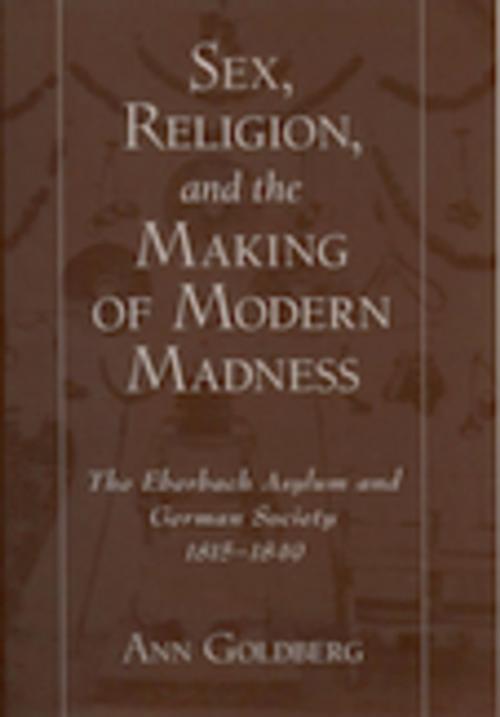Sex, Religion, and the Making of Modern Madness
The Eberbach Asylum and German Society, 1815-1849
Nonfiction, Health & Well Being, Psychology, History, Germany, Jewish| Author: | Ann Goldberg | ISBN: | 9780190286309 |
| Publisher: | Oxford University Press | Publication: | February 22, 2001 |
| Imprint: | Oxford University Press | Language: | English |
| Author: | Ann Goldberg |
| ISBN: | 9780190286309 |
| Publisher: | Oxford University Press |
| Publication: | February 22, 2001 |
| Imprint: | Oxford University Press |
| Language: | English |
How did the affliction we now know as insanity move from a religious phenomenon to a medical one? How did social class, gender, and ethnicity affect the experience of mental trauma and the way psychiatrists diagnosed and treated patients? In answering these questions, this important volume mines the rich and unusually detailed records of one of Germany's first modern insane asylums, the Eberbach Asylum in the duchy of Nassau. It is a book on the historical relationship between madness and modernity that both builds upon and challenges Michel Foucault's landmark work on this topic, a bold study that gives generous consideration to madness from the patient's perspective while also shedding new light on sexuality, politics, and antisemitism in nineteenth-century Germany. Drawing on the case records of several hundred asylum patients, Sex, Religion, and the Making of Modern Madness reconstructs the encounters of state officials and medical practitioners with peasant madness and deviancy during a transitional period in the history of both Germany and psychiatry. As author Ann Goldberg explains, this era witnessed the establishment of psychiatry as a legitimate medical specialty during a time of social upheaval, as Germany underwent the shift toward a capitalist order and the modern state. Focusing on such "illnesses" as religious madness, nymphomania, and masturbatory insanity, as well as the construct of Jewishness, she probes the daily encounters in which psychiatric categories were applied, experienced, and resisted within the settings of family, village, and insane asylum. The book is a model of microhistory, breaking new ground in the historiography of psychiatry as it synthetically applies approaches from "the history of everyday life," anthropology, poststructuralism, and feminist studies. In contrast to earlier, anecdotal studies of "the asylum patient," Goldberg employs diagnostic patterns to illuminate the ways in which madness--both in psychiatric practice and in the experience of patients--was structured by gender, class, and "race." She thus examines both the social basis of rural mental trauma in the Vormärz and the political and medical practices that sought to refashion this experience. This study sheds light on a range of issues concerning gender, religion, class relations, ethnicity, and state-building. It will appeal to students and scholars of a number of disciplines.
How did the affliction we now know as insanity move from a religious phenomenon to a medical one? How did social class, gender, and ethnicity affect the experience of mental trauma and the way psychiatrists diagnosed and treated patients? In answering these questions, this important volume mines the rich and unusually detailed records of one of Germany's first modern insane asylums, the Eberbach Asylum in the duchy of Nassau. It is a book on the historical relationship between madness and modernity that both builds upon and challenges Michel Foucault's landmark work on this topic, a bold study that gives generous consideration to madness from the patient's perspective while also shedding new light on sexuality, politics, and antisemitism in nineteenth-century Germany. Drawing on the case records of several hundred asylum patients, Sex, Religion, and the Making of Modern Madness reconstructs the encounters of state officials and medical practitioners with peasant madness and deviancy during a transitional period in the history of both Germany and psychiatry. As author Ann Goldberg explains, this era witnessed the establishment of psychiatry as a legitimate medical specialty during a time of social upheaval, as Germany underwent the shift toward a capitalist order and the modern state. Focusing on such "illnesses" as religious madness, nymphomania, and masturbatory insanity, as well as the construct of Jewishness, she probes the daily encounters in which psychiatric categories were applied, experienced, and resisted within the settings of family, village, and insane asylum. The book is a model of microhistory, breaking new ground in the historiography of psychiatry as it synthetically applies approaches from "the history of everyday life," anthropology, poststructuralism, and feminist studies. In contrast to earlier, anecdotal studies of "the asylum patient," Goldberg employs diagnostic patterns to illuminate the ways in which madness--both in psychiatric practice and in the experience of patients--was structured by gender, class, and "race." She thus examines both the social basis of rural mental trauma in the Vormärz and the political and medical practices that sought to refashion this experience. This study sheds light on a range of issues concerning gender, religion, class relations, ethnicity, and state-building. It will appeal to students and scholars of a number of disciplines.















